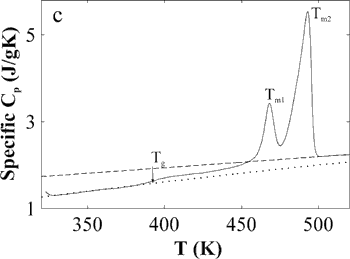Thermal analysis at the Cebe Lab
Differential scanning calorimetry (DSC), and its variant,
temperature-modulated DSC, are analytical methods used to measure the
specific heat capacity of polymers, biopolymers, and nanocomposites. The
Cebe Research Group used DSC to study the multiple melting endothermic
behavior of isotactic polystyrene, shown in the figure below. The semicrystalline
sample has a specific heat capacity that is intermediate between that
of the solid state (dotted line) and the liquid state (dashed line). At
350K, the sample is in the solid state. As temperature increases, the
sample undergoes its glass transition, and the heat capacity increases
at Tg. At the highest temperature, 525K, the sample is molten liquid.
Between Tg and the liquid state, the specific heat capacity departs from
the underlying baseline heat capacity whenever the sample goes through
a phase transition such as melting or crystallization. The deviations
representing multiple melting behavior are marked as Tm1 and Tm2. The
structural origin of these melting peaks is an active area of research
for our group.
|

